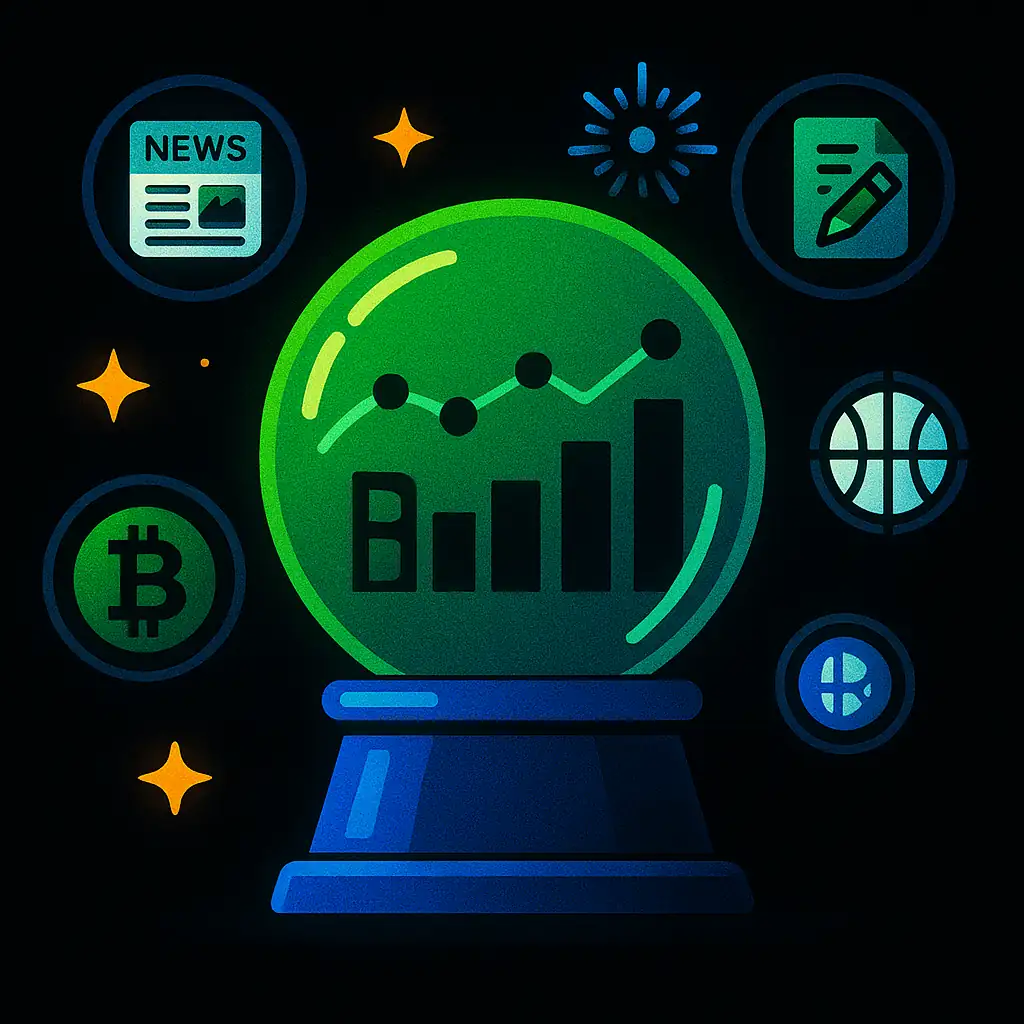Will Bitcoin hit $100K this year? Will Trump win the U.S. election? Will Drake’s next album drop before summer?
In Web3, you can bet on all of that — thanks to prediction markets.
These platforms let anyone create and trade markets about real-world events, all on-chain. It’s like a sportsbook for everything, powered by blockchain, smart contracts, and crypto liquidity.
Let’s break down what prediction markets are, how they work, and why degens love them.
What Is a Prediction Market?
A prediction market is a platform where people bet on the outcome of future events. Instead of odds set by a bookmaker, prices are determined by supply and demand.
- If more people bet “YES,” the price of YES shares goes up.
- If more people bet “NO,” the price of NO shares goes up.
- When the event resolves, winners get paid automatically.
In Web3, prediction markets run on smart contracts. That means:
- Bets are placed with crypto.
- Liquidity is provided by users, not bookies.
- Outcomes are settled by decentralized oracles (like Chainlink).
Real Examples
- Polymarket → The biggest decentralized prediction platform. Bets on politics, finance, culture. (Example: “Will ETH ETFs be approved by May 2025?”)
- Augur (legacy) → One of the first Ethereum dApps for prediction markets. Showed what’s possible, but struggled with UX.
- Kalshi (regulated, US) → Not Web3-native, but SEC-approved prediction markets in the U.S. (sports, weather, elections).
- Gnosis (now Cow Protocol) → Early Ethereum project exploring prediction markets as decentralized forecasting tools.
How Prediction Markets Work
- Market Creation → Anyone can create a market (“Will BTC be above $70K on Dec 31, 2025?”).
- Trading Shares → Players buy “YES” or “NO” shares. The price reflects probability.
- Example: If YES shares trade at $0.70, the market believes there’s a 70% chance of YES.
- Liquidity Pools → AMMs (automated market makers) provide liquidity so trading is always possible.
- Resolution → When the event happens, an oracle confirms the outcome. Winners get $1 per winning share.
- Payouts → Instantly distributed on-chain, no disputes.
It’s not just betting. It’s also crowd-sourced forecasting. Markets often predict outcomes more accurately than polls or analysts.
Why Degens Love Prediction Markets
- Bet on anything → Elections, crypto prices, celebrity drama.
- Fair pricing → No bookie odds. Markets set themselves.
- Liquidity providers earn → Just like in casinos, LPs collect fees.
- On-chain payouts → Instant, transparent, global.
Example: During the 2020 U.S. election, Polymarket traded over $100M in bets, with on-chain prices shifting in real time as results rolled in.
The Difference vs Sportsbooks
- Sportsbooks (Stake, Bet365) → Odds are set by the house.
- Prediction markets (Polymarket, Augur) → Odds emerge from traders’ collective belief.
It’s decentralized bookmaking — the crowd is the house.
Risks in Prediction Markets
Not everything is wagmi. Risks include:
- Oracle risk → If an oracle reports wrong data, outcomes can be disputed.
- Liquidity risk → Small markets can have low volume, making it hard to enter/exit.
- Regulation → Many countries classify prediction markets as gambling. Platforms like Polymarket geo-block U.S. users.
- Volatility → If you bet with ETH/USDT and the price moves, your bankroll shifts even before the bet resolves.
Famous Scandals & Headlines
- Augur’s “Assassination Markets” (2018) → Early users created morbid bets like “Will X politician die by end of year?” Regulators freaked, hurting Augur’s growth.
- Polymarket (2022) → CFTC fined Polymarket $1.4M for offering unregistered markets in the U.S. (platform continued outside U.S. jurisdiction).
- Election mania → Polymarket became a go-to source for political forecasts, often beating traditional polls in accuracy.
Prediction Markets in Numbers
- Global prediction market volume is already in the billions (mostly Polymarket).
- In 2024, Polymarket raised $45M from investors (including Peter Thiel’s Founders Fund).
- Markets regularly hit $50M+ liquidity around major events like U.S. elections or Bitcoin ETF approvals.
The Future: More Than Gambling
Prediction markets aren’t just about degen bets. They can:
- Forecast pandemics, inflation, or elections more accurately than experts.
- Help businesses hedge risks (e.g., “Will oil prices be above $100?”).
- Let communities decide resource allocation based on predictive signals.
But for most players? It’s the thrill of betting on literally anything.
How to Play Safely
- Stick to platforms with volume + history (Polymarket, Kalshi).
- Use stablecoins (USDC/USDT) to avoid volatility risk.
- Start with liquid markets (big events, sports, crypto prices).
- Never bet more than you’re ready to lose — house edge in prediction markets is lower, but risk is still real.
Final Word
So, what are prediction markets? They’re decentralized platforms where you can bet on anything — from Bitcoin’s price to political elections to pop culture.
Unlike traditional sportsbooks, odds aren’t set by the house. They emerge from the crowd. Payouts are instant, provable, and on-chain.
Are they safe? Safer than shady casinos, but still high-risk. Are they legal? Depends on your country. Are they fun? Absolutely — especially if you’ve ever wanted to gamble on things no sportsbook would touch.
In Web3 gambling, prediction markets are where degen culture meets real-world forecasting. They’re not just casinos — they’re crystal balls powered by crypto.
Bet smart, fam. Wagmi 🚀


